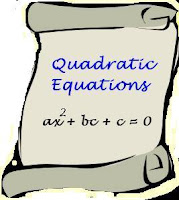Quadratic Equations
Standard form of equation is
ax2 + bx + c = 0
where a, b and c are the co-efficients and a ≠ 0Q1: Check whether the following are quadratic equations :
(i) (x + 1)2 = 2(x – 3)
(ii) x2 – 2x = (–2) (3 – x)
(iii) (x – 2)(x + 1) = (x – 1)(x + 3)
(iv) (x – 3)(2x +1) = x(x + 5)
(v) (2x – 1)(x – 3) = (x + 5)(x – 1)
(vi) x2 + 3x + 1 = (x – 2)2
Answer:






